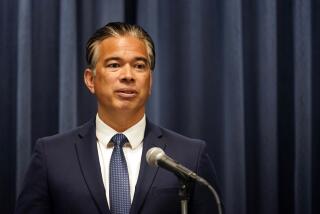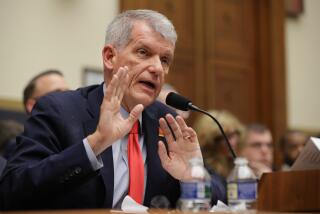SEC fraud lawsuit targets three former IndyMac executives
- Share via
The Securities and Exchange Commission has accused former executives of the housing boom’s biggest stated-income lender, IndyMac Bancorp, of defrauding investors at the failed Pasadena savings and loan.
The civil lawsuit, filed Friday in federal court in Los Angeles, contends that former Chief Executive Michael W. Perry and former CFOs A. Scott Keys and S. Blair Abernathy misled investors about the crumbling financial condition of IndyMac and its IndyMac Bank operating unit by filing false disclosures with the SEC.
“The three executives regularly received internal reports about IndyMac’s deteriorating capital and liquidity positions in 2007 and 2008, but failed to ensure adequate disclosure of that information to investors as IndyMac sold millions of dollars in new stock,” the SEC said in a news release.
Through their attorneys, Perry and Keys said they would contest the lawsuit.
Abernathy settled the suit without admitting or denying the allegations. He agreed to pay more than $125,000 and be suspended for two years from doing accountant work that would go before the SEC.
IndyMac failed in July 2008 after a run on its deposits. It was the first in a series of major bank collapses and near-failures that later included Washington Mutual Inc. and Wachovia Corp., as defaults on risky mortgages threatened to bring down the financial industry.
Perry’s attorney, D. Jean Veta of Washington, D.C., said the SEC complaint was meritless “Monday morning quarterbacking.” The suit makes no sense, Veta said, because Perry was buying IndyMac stock at the time he supposedly was misleading investors.
Perry and IndyMac were “the victims of a bank run and the unprecedented financial tsunami that nobody — not Mr. Perry, not the SEC, nor anybody else — saw coming,” Veta said, calling her client a “capable, hard-working CEO who led IndyMac … with courage, honesty and integrity.”
Keys’ attorney, Gregory S. Bruch of Washington, said he expected to win the lawsuit. He said that by February 2008 — when his client is accused of wrongdoing — “anyone who read IndyMac’s presentations knew how difficult the future was for that bank.”
“The SEC is dead wrong here,” Bruch said. “I don’t think there is the slightest evidence that Mr. Keys defrauded anybody.”
The SEC previously settled lawsuits against former executives of two other high-risk lenders based in Southern California: the bankrupt Irvine subprime specialist New Century Financial Corp. and Countrywide, which was the largest mortgage originator in the country. The executives of those lenders did not deny or admit allegations that they deceived investors about the condition of their companies.
More to Read
Inside the business of entertainment
The Wide Shot brings you news, analysis and insights on everything from streaming wars to production — and what it all means for the future.
You may occasionally receive promotional content from the Los Angeles Times.











